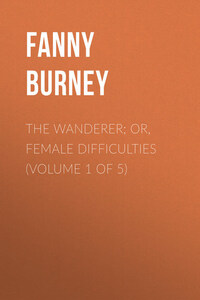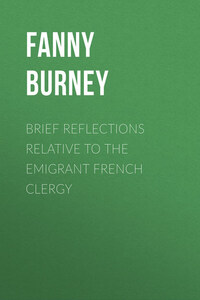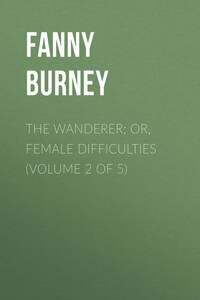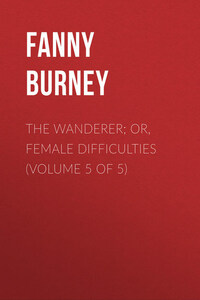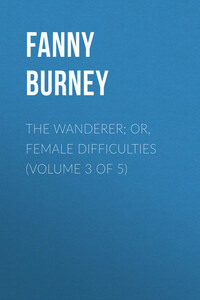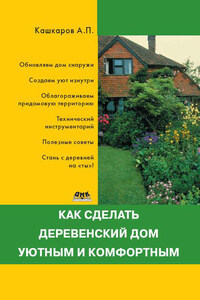TO DOCTOR BURNEY,
FRS
and correspondent to the institute of France1The earliest pride of my heart was to inscribe to my much-loved Father the first public effort of my pen; though the timid offering, unobtrusive and anonymous, was long unpresented; and, even at last, reached its destination through a zeal as secret as it was kind, by means which he would never reveal; and with which, till within these last few months, I have myself been unacquainted.
With what grateful delight do I cast, now, at the same revered feet where I prostrated that first essay, this, my latest attempt!
Your name I did not dare then pronounce; and myself I believed to be 'wrapt up in a mantle of impenetrable obscurity2.' Little did I foresee the indulgence that would bring me forward! and that my dear father himself, whom, even while, urged by filial feelings, and yet nameless, I invoked,3 I thought would be foremost to aid, nay, charge me to shun the public eye; that He, whom I dreaded to see blush at my production, should be the first to tell me not to blush at it myself! The happy moment when he spoke to me those unexpected words, is ever present, and still gay to my memory.
The early part of this immediate tribute has already twice traversed the ocean in manuscript: I had planned and begun it before the end of the last century but the bitter, and ever to be deplored affliction with which this new era opened to our family, in depriving us of the darling of our hearts,4 at the very moment – when – after a grievous absence, we believed her restored to us, cast it from my thoughts, and even from my powers, for many years. I took with me, nevertheless, my prepared materials in the year 1802, to France; where, ultimately, though only at odd intervals, I sketched the whole work; which, in the year 1812, accompanied me back to my native land. And, to the honour and liberality of both nations, let me mention, that, at the Custom-house on either – alas! – hostile shore, upon my given word that the papers contained neither letters, nor political writings; but simply a work of invention and observation; the voluminous manuscript was suffered to pass, without demur, comment, or the smallest examination.
A conduct so generous on one side, so trusting on the other, in time of war, even though its object be unimportant, cannot but be read with satisfaction by every friend of humanity, of either rival nation, into whose hands its narrative may chance to fall.
Such, therefore, – if any such there be, – who expect to find here materials for political controversy; or fresh food for national animosity; must turn elsewhere their disappointed eyes: for here, they will simply meet, what the Author has thrice sought to present to them already, a composition upon general life, manners, and characters; without any species of personality, either in the form of foreign influence, or of national partiality. I have felt, indeed, no disposition, – I ought rather, perhaps, to say talent, – for venturing upon the stormy sea of politics; whose waves, for ever either receding or encroaching, with difficulty can be stemmed, and never can be trusted.
Even when I began; – how unconsciously you, dear Sir, well know, – what I may now, perhaps, venture to style my literary career, nothing can more clearly prove that I turned, instinctively, from the tempestuous course, than the equal favour with which I was immediately distinguished by those two celebrated, immortal authors, Dr Johnson and the Right Honourable Edmund Burke; whose sentiments upon public affairs divided, almost separated them, at that epoch; yet who, then, and to their last hours, I had the pride, the delight, and the astonishment to find the warmest, as well as the most eminent supporters of my honoured essays. Latterly, indeed, their political opinions assimilated; but when each, separately, though at the same time, condescended to stand for the champion of my first small work; ere ever I had had the happiness of being presented to either; and ere they knew that I bore, my Father! your honoured name; that small work was nearly the only subject upon which they met without contestation5: – if I except the equally ingenious and ingenuous friend whom they vied with each other to praise, to appreciate, and to love; and whose name can never vibrate on our ears but to bring emotion to our hearts; – Sir Joshua Reynolds.
If, therefore, then, – when every tie, whether public or mental, was single; and every wish had one direction; I held political topics to be without my sphere, or beyond my skill; who shall wonder that now, – united, alike by choice and by duty, to a member of a foreign nation, yet adhering, with primæval enthusiasm, to the country of my birth, I should leave all discussions of national rights, and modes, or acts of government, to those whose wishes have no opposing calls; whose duties are undivided; and whose opinions are unbiased by individual bosom feelings; which, where strongly impelled by dependant happiness, insidiously, unconsciously direct our views, colour our ideas, and entangle our partiality in our interests.
